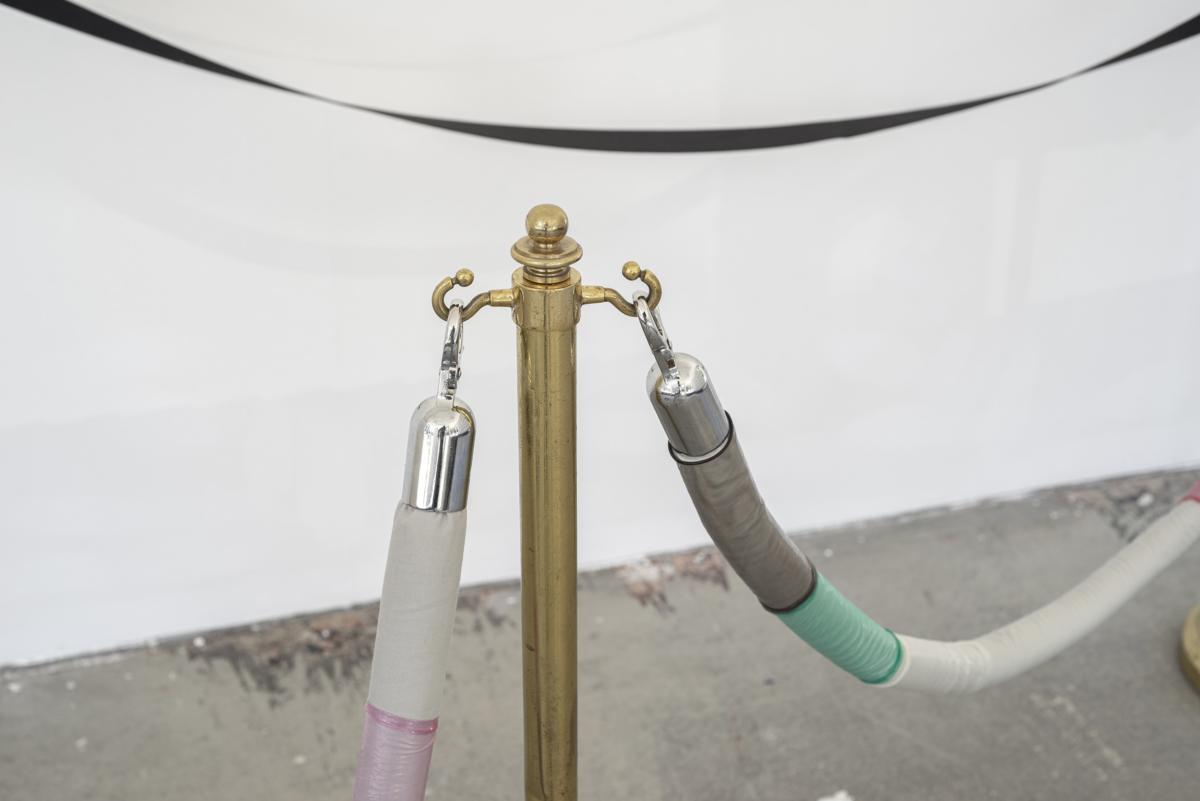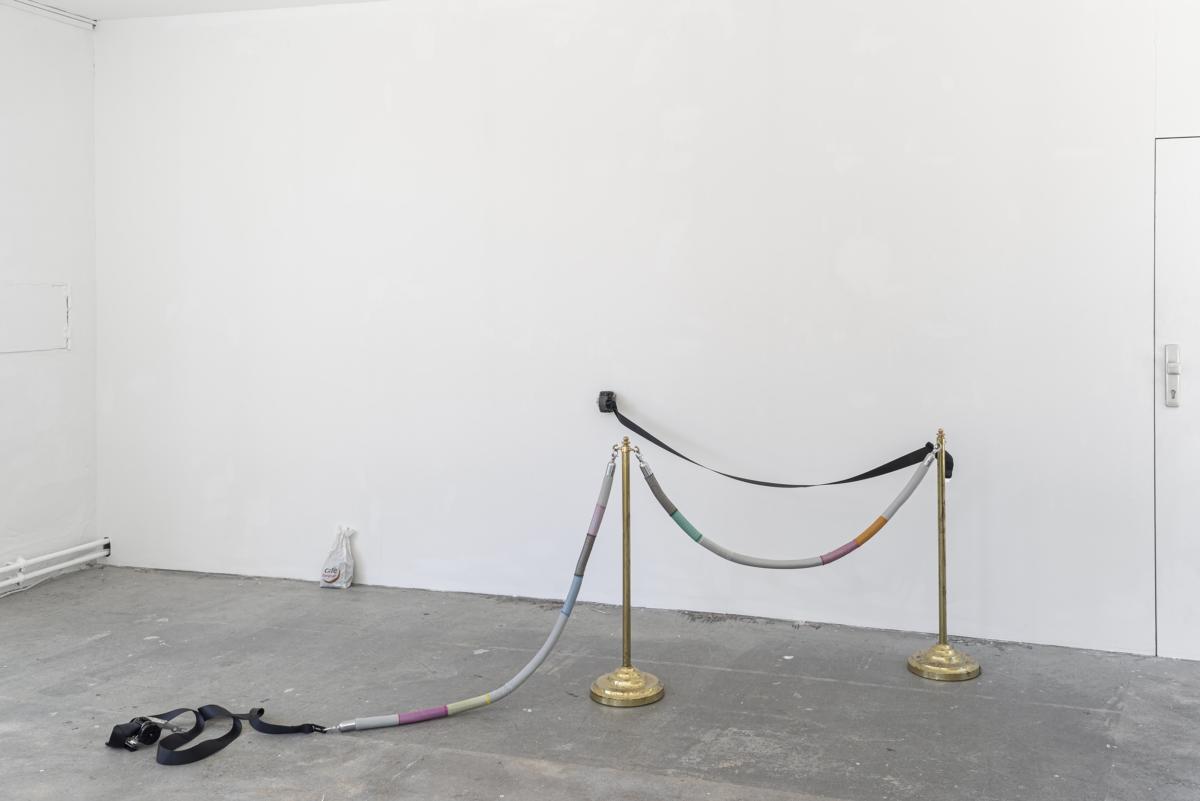[EN/DE] ‘Émissions nocturnes’ by Aude Pariset at LVX. Pavilion of the Volksbühne
![[EN/DE] ‘Émissions nocturnes’ by Aude Pariset at LVX. Pavilion of the Volksbühne](https://blokmagazine.com/wp-content/uploads/2020/07/4a.jpg)
[EN]
text: Elodie Evers
Aude Pariset has hung two duvets of different sizes in the pavilion. They frame several images of cars in traffic jams: the image sections depict snaking lines of heavy traffic, blurrily and dully printed onto these fluffy surfaces that would normally envelop bodies and lull them to sleep. The cars are driving towards the horizon, perhaps toward the next summer holiday, I imagine, and so the reality of air particles and frustration promptly gives way to sentimental memories of long journeys. The traffic jam as a place of longing? Not surprising, when Pariset presents it here as if it were on an advertising banner. The desire to move forward coupled with simultaneous stagnation: all passengers separated into their own small sheet metal cells, but en route to a polluted future together. And on this subject: Did you know that nocturnal ejaculation is also referred to as pollution, as contamination? In English it is also called a “nocturnal emission,” while in French it is referred to as “pollution nocturne.” When I think of emissions, I immediately think of pollution. Of the diesel scandal and greenhouse gases. This corresponds with the fact that the quality and quantity of sperm has drastically decreased in the last fifty years, not least because of the increase in harmful environmental influences. The rate of reproduction and climate change are therefore both, in a sense, direct consequences of particle emissions into the environment. The human species is heading toward its demise, but not much else is on the move right now…
The exhibition is funded by the Senatsverwaltung für Kultur und Europa.







[DE]
text: Elodie Evers
Aude Pariset hat zwei unterschiedlich große Bettdecken in den Pavillon gehängt. Diese rahmen mehrere Bilder von im Stau stehenden Autos: Die Bildausschnitte zeigen den sich schlängelnden, dichten Verkehr, der leicht verschwommen und pomadig auf die flauschigen Oberflächen gedruckt wurde, die sonst Körper umhüllen und in den Schlaf begleiten. Die Autos fahren Richtung Horizont – vielleicht in den nächsten Sommerurlaub, so meine Fantasie, und prompt weicht die Realität aus Feinstaub und Frustration sentimentalen Erinnerungen an weite Reisen. Der Stau als Sehnsuchtsort – kein Wunder, wird er von Pariset doch wie auf einem Werbebanner präsentiert. Der Wunsch nach Fortbewegung bei gleichzeitiger Stagnation – alle Passagiere sitzen separiert in ihren kleinen Blechzellen, gemeinsam auf dem Weg in eine verschmutzte Zukunft. Apropos: Wussten Sie, dass ein nächtlicher Samenerguss auch „Pollution“ genannt, also als Verschmutzung bezeichnet wird? Im Englischen nennt man ihn auch „nocturnal emission“, während man im Französischen „pollution nocturne“ sagt. Bei Emissionen denke ich natürlich sofort an Umweltverschmutzung. An Dieselskandal und Treibhausgase. Dazu passt, dass die Qualität und Quantität von Spermien in den letzten 50 Jahren nicht zuletzt wegen vermehrter schädlicher Umwelteinflüsse drastisch abgenommen hat. Die Reproduktionsrate und der Klimawandel stehen also gleichermaßen in einem ursächlichen Zusammenhang mit Teilchenausstößen in die Umwelt. Die menschliche Spezies bewegt sich auf ihren Untergang zu. Ansonsten bewegt sich gerade nicht viel…
Die Ausstellung wird gefördert von der Senatsverwaltung für Kultur und Europa.
Imprint
| Artist | Aude Pariset |
| Exhibition | Émissions nocturnes |
| Place / venue | LVX. Pavilion of the Volksbühne |
| Dates | 19 June – 23 August 2020 |
| Curated by | Elodie Evers |
| Website | www.volksbuehne.berlin/en/haus/spielstaetten/7154/lvx |
| Index | Aude Pariset Elodie Evers LVX. Pavilion of the Volksbühne |

